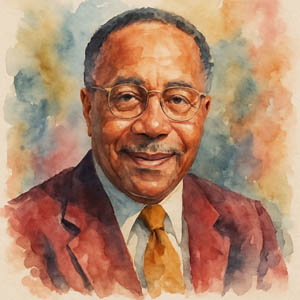— Alex Haley
 A man of deep reflection and enduring purpose, writer Alexander Murray Palmer Haley (1921–1992) was born on this day in Ithaca, New York. Through the power of story, he helped spark a worldwide genealogy revolution.
A man of deep reflection and enduring purpose, writer Alexander Murray Palmer Haley (1921–1992) was born on this day in Ithaca, New York. Through the power of story, he helped spark a worldwide genealogy revolution.
"You can never enslave somebody who knows who he is," Haley once said—with quiet certainty.
Beginning as a journalist for Playboy, his first interview in 1959 was with jazz great Miles Davis. A soul-stirring conversation with Malcolm X later became The Autobiography of Malcolm X (1965)—a book that changed the national conversation.
"Either you deal with what is the reality, or you can be sure that the reality is going to deal with you," he warned, with clear-eyed grace.
Inspired by stories passed down by his grandparents, Haley journeyed to Gambia in 1967 and began a nine-year search for his family’s roots. “In every conceivable manner, the family is the link to our past, the bridge to our future,” he said. That bridge became his life's work.
With Roots (1976), Haley traced seven generations back to Kunta Kinte, an African man kidnapped and enslaved. The Pulitzer-winning saga awakened the world to the power of heritage and identity, and the televised version reached over 130 million hearts.
“Roots is not just a saga of my family. It is the symbolic saga of a people,” he explained—offering his story as a mirror for others to see themselves.
“The ancestors of all of us came across that same ocean in some ship,” he reminded. “We must learn not only to live together, but to see one another as people, rather than stereotypes.”
“To this day,” he once reflected, “people—particularly African-American people, but white people as well—will just totally, unexpectedly walk up and not say a word, just hug you and then say, 'Thank you.'”
He was honored among the Top 100 Writers of the 20th Century. Click to explore the rest.
 Allow your ideas to bubble and cook.✨💜
Allow your ideas to bubble and cook.✨💜
